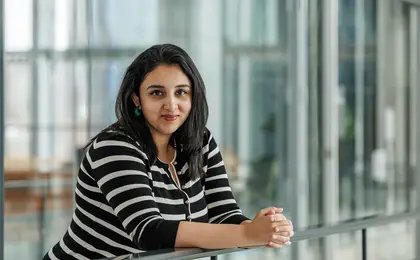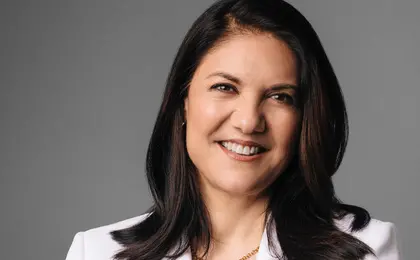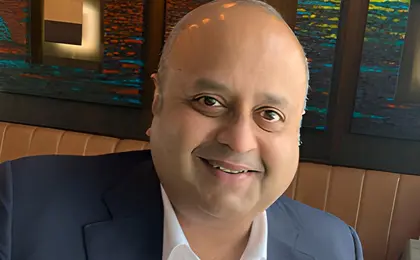
Mena Cammett ’12
MBA
Senior Risk Officer and Economist, Multilateral Investment Guarantee Agency (World Bank Group)
By Rebecca Beyer
When Mena Cammett was in her senior year at Yale College, she learned about a Yale School of Management class called Doing Business in the Developing World. As someone who wanted to facilitate investments in emerging market countries, she was intrigued, so she reached out to Professor Ahmed Mushfiq Mobarak to ask about enrolling.
“I asked, ‘Do you have a spot for me?’” she remembers. “He said, ‘Yes, but I have to tell you, this class is hard.’”
Cammett was up for the challenge: She ended up serving two years as Mobarak’s teaching assistant. The experience changed the course of her professional life.
“I was fluent in the language of economics and country risk, but I realized there was so much I didn’t know about the language of business and investments,” she says.
Cammett hadn’t previously considered an MBA, but she “decided to do the Silver Scholars program then and there.” The program allows ambitious college seniors to pursue a Yale MBA immediately after graduation by spending one year on campus taking core curriculum classes, working full-time for at least a year, and then returning to SOM to finish the program with electives that match their interests and professional goals. For Cammett, the program served as a springboard for a career analyzing the risks and potential impacts of investments in the public and private sector throughout the Middle East and Africa. Today she is a senior risk officer and economist at the World Bank’s Multilateral Investment Guarantee Agency (MIGA). SOM and Mobarak’s class were “where it all started,” she says.
Cammett grew up in Fort Greene, Brooklyn, in a family of academics. Her mother is a law professor at City University of New York School of Law; her grandparents were historians; her aunt is on the faculty at Harvard University. When she was 18, Cammett spent several weeks in Lebanon while her aunt studied sectarianism in that country. That experience—and living through the September 11 attacks as a high school freshman—made Cammett want to focus her studies on the Middle East.
“I thought I would go into diplomacy and make the world a better place” by preventing terrorist attacks, she says.
But, at Yale, where she also studied Arabic and Islamic Studies, Cammett found the material in her first international relations class too abstract. She gravitated instead toward economic development.
“I fell in love with the subject—the whole idea of private sector development facilitating investments in emerging markets that need it,” she says. “You need investment for growth—any country does—and policies that help businesses can also help people.”
After her first year at SOM, Cammett interned at the U.S. International Development Finance Corporation and then moved to Cairo, Egypt, where she organized conferences on macroeconomic issues in Egypt for a think tank. When a revolution in the country toppled the regime of President Hosni Mubarak, she moved to a consulting firm in New York.
Back at SOM, she took a class called Emerging Markets Finance with Zhiwu Chen, which taught students how to determine the credibility of financial modeling for projects. “That’s literally what I do” in her role at the World Bank, she says.
Cammett, who is vice president of the Yale International Alliance, also appreciated the freedom SOM gave students to explore courses throughout the university; she took a class on international arbitration at Yale Law School that has proven to be “extremely relevant” in her work at MIGA, where clients must exhaust potential legal remedies before making a claim on a loss the World Bank agency has insured.
Cammett calls her role at MIGA, which provides political risk insurance to investors and lenders in developing countries, her “dream job.” Yet, a few years ago, she turned it down to take a position in London with a commercial insurance company.
“I agonized over that decision,” she recalls. “But that’s been my philosophy due to my parents: If something is meant to happen, it will. You shouldn’t operate from a fear of losing something.”
Ultimately, Cammett says, the experience she gained in the private sector made her a better candidate for the World Bank job when it opened up again in 2018.
“I didn’t account for how much better of a position I would be in,” she says. “I think I’m much more successful in my current role because of everything that happened. That was a really big leap of faith, but I trusted my gut. I’m glad it paid off.”
At MIGA Cammett has made assessments on projects ranging from an agriculture project in the West Bank to a financial services company in Iraq to a wind farm in Djibouti. During a recent interview, she was in Dakar, Senegal, talking to people about a potential transportation development.
“If you’re intellectually curious, this is an amazing field to be in,” she says.
The work can also be stressful: Part of Cammett’s job is to determine the likelihood of political coups, riots, and military interventions, among other risks. But she also estimates the potential positive impacts that might weigh in favor of MIGA insuring a proposed project.
“I’m responsible for justifying why we would take that risk—for the benefit of the local community, the host country, the population,” she says. “I have always loved helping get investments into countries that need it, and I love being able to substantiate the development impact.”
Interviewed on September 26, 2022
Related Profiles

Shreya Arora ’25

Mary Ellen Iskenderian ’86

